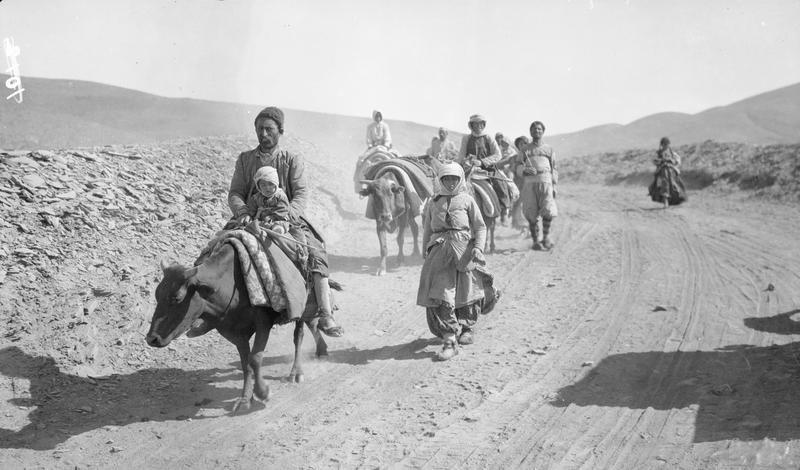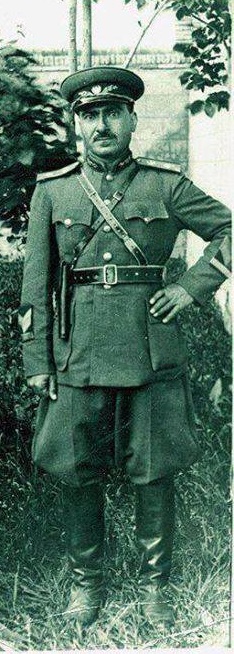|
Sarsing
Sarsing ( ku, سەرسەنگ, Sersing, syr, ܣܪܣܢܓ) is a town and sub-district in the Dohuk Governorate in Kurdistan Region, Iraq. It is located in the Sapna valley in the Amadiya District. In the town, there is a church of Mar Mattai. There was previously a shrine of Mar Giwargis. History In 1922, Sarsing was settled by Assyrian refugees of the Tyari clan from Hakkari atop the ruins of an old Assyrian village. Upon its resettlement, the population consisted of 100 Assyrian families in 40 households, all adherents of the Church of the East, who had survived the Assyrian genocide in Turkey. The population shrank to roughly 150 people in 1933 amidst the Simele massacre, but recovered to 301 people in 55 families by 1938. A royal palace was constructed at Sarsing by Crown Prince 'Abd al-Ilah, regent to King Faisal II of Iraq, and was often visited by both regent and king in the summer. King Faisal II had a shrine of Mar Giwargis built in the place of a ruined monastery ... [...More Info...] [...Related Items...] OR: [Wikipedia] [Google] [Baidu] |
Amadiya District
Amadiya District ( ku, قەزای ئامێدی, Qezaye Amêdî, ar-at, قضاء العمادية, qaḍāʾ al-Emadiyah) is a Districts of Iraq, district of Duhok Governorate in Kurdistan Region, Iraq. The administrative centre is Amadiya. Subdistricts The district has the following sub-districts: *Amadiya *Bamarni *Chamanke *Deraluk *Kani Masi *Sarsing References Districts of Dohuk Province Geography of Iraqi Kurdistan Amadiya {{Iraqi Kurdistan-geo-stub ... [...More Info...] [...Related Items...] OR: [Wikipedia] [Google] [Baidu] |
List Of Sovereign States
The following is a list providing an overview of sovereign states around the world with information on their status and recognition of their sovereignty. The 206 listed states can be divided into three categories based on membership within the United Nations System: 193 member states of the United Nations, UN member states, 2 United Nations General Assembly observers#Present non-member observers, UN General Assembly non-member observer states, and 11 other states. The ''sovereignty dispute'' column indicates states having undisputed sovereignty (188 states, of which there are 187 UN member states and 1 UN General Assembly non-member observer state), states having disputed sovereignty (16 states, of which there are 6 UN member states, 1 UN General Assembly non-member observer state, and 9 de facto states), and states having a political status of the Cook Islands and Niue, special political status (2 states, both in associated state, free association with New Zealand). Compi ... [...More Info...] [...Related Items...] OR: [Wikipedia] [Google] [Baidu] |
Assyrian Genocide
The Sayfo or the Seyfo (; see below), also known as the Assyrian genocide, was the mass slaughter and deportation of Assyrian / Syriac Christians in southeastern Anatolia and Persia's Azerbaijan province by Ottoman forces and some Kurdish tribes during World War I. The Assyrians were divided into mutually antagonistic churches, including the Syriac Orthodox Church, the Church of the East, and the Chaldean Catholic Church. Before World War I, they lived in mountainous and remote areas of the Ottoman Empire (some of which were effectively stateless). The empire's nineteenth-century centralization efforts led to increased violence and danger for the Assyrians. Mass killing of Assyrian civilians began during the Ottoman occupation of Azerbaijan from January to May 1915, during which massacres were committed by Ottoman forces and pro-Ottoman Kurds. In Bitlis province, Ottoman troops returning from Persia joined local Kurdish tribes to massacre the local Christian population ... [...More Info...] [...Related Items...] OR: [Wikipedia] [Google] [Baidu] |
Masoud Barzani
Masoud Barzani ( ku, ,مهسعوود بارزانی, translit=Mesûd Barzanî}; born 16 August 1946) is a Kurdish politician who has been leader of the Kurdistan Democratic Party (KDP) since 1979, and was President of the Kurdistan Region of Iraq from 2005 to 2017. Early life and career Barzani was born in the territory controlled by the self-declared Republic of Mahabad, and succeeded his father Mustafa Barzani as leader of the KDP in 1979. Working closely with his brother Idris Barzani until Idris's death, Barzani and various other Kurdish groups fought with the Islamic Republic of Iran against the Iraqi military during the Iran–Iraq War. Barzani has played a key role in the development of the Kurdistan Region polity since the Gulf War. President of Kurdistan Region A major result of Saddam Hussein's defeat in the Gulf War (1991) and Operation Provide Comfort was the ultimate establishment of Kurdish control over their traditional homeland in northern Iraq, known as ... [...More Info...] [...Related Items...] OR: [Wikipedia] [Google] [Baidu] |
Kurdistan Democratic Party
The Kurdistan Democratic Party ( ku, Partiya Demokrat a Kurdistanê; پارتی دیموکراتی کوردستان), usually abbreviated as KDP or PDK, is the largest party in Iraqi Kurdistan and the senior partner in the Kurdistan Regional Government. It was founded in 1946 in Mahabad in Iranian Kurdistan. The party states that it combines "democratic values and social justice to form a system whereby everyone in Kurdistan can live on an equal basis with great emphasis given to rights of individuals and freedom of expression." The KDP is dominated by the Barzani tribe and described as a Kurdish nationalist big tent party. History Foundation In 1946, the leader of the Soviet-backed Republic of Mahabad, Qazi Muhammad, announced the formation of a "Kurdish Democratic Party" based in Iran, or Eastern Kurdistan. The Soviet Union, then supporting the Kurdish national struggle against the monarchies of Iran and Iraq, instructed Mustafa Barzani to place himself under t ... [...More Info...] [...Related Items...] OR: [Wikipedia] [Google] [Baidu] |
Erbil Governorate
ku, پارێزگای ھەولێر , other_name = , image_skyline = Collage_of_Hawler_-_Erbil_Governorate.jpg , imagesize = , image_caption = Clockwise, from top: Canyon in Rawandiz, Koy Sanjaq, Shaqlawa and Citadel of Erbil , image_map = Arbil in Iraq.svg , map_alt = Erbil governorate area highlighted in red , map_caption = , image_map1 = Kurdistan_governorates_2015.png , map_alt1 = Erbil governorate within the Iraqi Kurdistan region , map_caption1 = Erbil Governorate within Kurdistan Region , image_seal = Seal of Erbil Governorate.png , settlement_type = Governorate , subdivision_type = Country , subdivision_name = Iraq , subdivision_type1 = Region , subdivision_name1 ... [...More Info...] [...Related Items...] OR: [Wikipedia] [Google] [Baidu] |
Iraqi No-fly Zones
The Iraqi no-fly zones conflict was a low-level conflict in the two no-fly zones (NFZs) in Iraq that were proclaimed by the United States, United Kingdom, and France after the Gulf War of 1991. The United States stated that the NFZs were intended to protect the ethnic Kurdish minority in northern Iraq and Shiite Muslims in the south. Iraqi aircraft were forbidden from flying inside the zones. The policy was enforced by the United States and the United Kingdom until 2003, when it was rendered obsolete by the 2003 invasion of Iraq. French aircraft patrols also participated until France withdrew in 1996. The Iraqi government claimed 1,400 civilians were killed by Coalition bombing during the NFZ. The Kurdish dominated north gained effective autonomy and was protected from a feared repeat of the Anfal genocide in 1988 that killed tens of thousands of civilians. Over 280,000 sorties were flown in the first 9 years of the NFZs. This military action was not authorised by the United N ... [...More Info...] [...Related Items...] OR: [Wikipedia] [Google] [Baidu] |
Al-Anfal Campaign
The Anfal campaign; ku, شاڵاوی ئەنفال or the Kurdish genocide was a counterinsurgency operation which was carried out by Ba'athist Iraq from February to September 1988, at the end of the Iran–Iraq War. The campaign targeted rural Kurds because its purpose was to eliminate Kurdish rebel groups and Arabize strategic parts of the Kirkuk Governorate. The Iraqi forces were led by Ali Hassan al-Majid, on the orders of President Saddam Hussein. The campaign's name was taken from the title of Qur'anic chapter 8 (''al-ʾanfāl''). In 1993, Human Rights Watch released a report on the Anfal campaign based on documents captured by Kurdish rebels during the 1991 uprisings in Iraq; HRW described it as a genocide and estimated between 50,000 to 100,000 deaths. Although many Iraqi Arabs reject that there were any mass killings of Kurdish civilians during Anfal, the event is an important element constituting Kurdish national identity. Background Following the Iraqi inv ... [...More Info...] [...Related Items...] OR: [Wikipedia] [Google] [Baidu] |
Mustafa Barzani
Mustafa Barzani ( ku, مەلا مستهفا بارزانی, Mistefa Barzanî; 14 March 1903 – 1 March 1979) also known as Mela Mustafa (Preacher Mustafa), was a Kurdish leader, general and one of the most prominent political figures in modern Kurdish politics. In 1946, he was chosen as the leader of the Kurdistan Democratic Party (KDP) to lead the Kurdish revolution against Iraq. Barzani was the primary political and military leader of the Kurdish revolution until his death in March 1979. He led campaigns of armed insurgency against both the Iraqi and Iranian governments.Korn, David (1994-06)''"The Last Years of Mustafa Barzani."'' Retrieved 2006-11-15. Early life Mustafa Barzani was born in 1903 in |
Araden
Araden ( ar, أرادن, , syr, ܐܪܕܢ) is a village in Dohuk Governorate in Kurdistan Region, Iraq. It is located in the Sapna valley in the Amadiya District. In the village, there are Chaldean Catholic churches of Mart Shmune, Sultana Mahdokht, and Mar Awda. There is also a church of the Sacred Heart of Jesus. Etymology According to local tradition, the name of the village is derived from "ara" ("land" in Syriac) and "aden" ("Eden" in Syriac), and thus translates to "land of Eden". History It is suggested that one or all of the churches of Mart Shmune, Sultana Mahdokht, and Mar Awda may have been constructed over a thousand years ago. Local tradition attests that the church of Sultana Mahdokht was constructed by a pilgrim who was instructed to build a church there in a dream from the saint after he had discovered a relic of the saint's arm. The population of Araden were likely adherents of the Church of the East long before the 14th century. The village was a notable c ... [...More Info...] [...Related Items...] OR: [Wikipedia] [Google] [Baidu] |
Kurds
ug:كۇردلار Kurds ( ku, کورد ,Kurd, italic=yes, rtl=yes) or Kurdish people are an Iranian peoples, Iranian ethnic group native to the mountainous region of Kurdistan in Western Asia, which spans southeastern Turkey, northwestern Iran, northern Iraq, and northern Syria. There are exclaves of Kurds in Central Anatolia Region, Central Anatolia, Khorasan Province, Khorasan, and the Caucasus, as well as significant Kurdish diaspora communities in the cities of western Turkey (in particular Istanbul) and Western Europe (primarily Kurds in Germany, in Germany). The Kurdish population is estimated to be between 30 and 45 million. Kurds speak the Kurdish languages and the Zaza–Gorani languages, which belong to the Western Iranian languages, Western Iranian branch of the Iranian languages. After World War I and the defeat of the Ottoman Empire, the victorious Allies of World War I, Western allies made provision for a Kurdish state in the 1920 Treaty of Sevres, Treaty ... [...More Info...] [...Related Items...] OR: [Wikipedia] [Google] [Baidu] |
First Iraqi–Kurdish War
The First Iraqi–Kurdish WarMichael G. Lortz. (Chapter 1, Introduction). ''The Kurdish Warrior Tradition and the Importance of the Peshmerga''. pp.39-42. (Arabic: الحرب العراقية الكردية الأولى) also known as Aylul revolts ( ku, شۆڕشی ئەیلوول) was a major event of the Iraqi–Kurdish conflict, lasting from 1961 until 1970. The struggle was led by Mustafa Barzani, in an attempt to establish an autonomous Kurdish administration in northern Iraq. Throughout the 1960s, the uprising escalated into a long war, which failed to resolve despite internal power changes in Iraq. During the war, 80% of the Iraqi army was engaged in combat with the Kurds. The war ended with a stalemate in 1970, resulting in between 75,000 to 105,000 casualties. A series of Iraqi–Kurdish negotiations followed the war in an attempt to resolve the conflict. The negotiations led to the Iraqi–Kurdish Autonomy Agreement of 1970. Background After the military coup by Abd ... [...More Info...] [...Related Items...] OR: [Wikipedia] [Google] [Baidu] |






.jpg)
